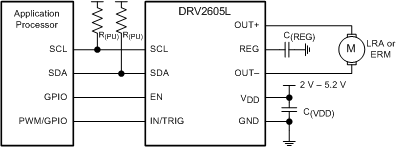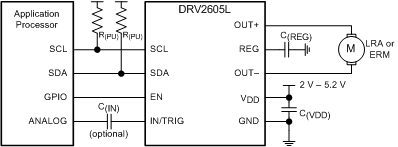ZHCSDF3D May 2014 – March 2018 DRV2605L
PRODUCTION DATA.
- 1 特性
- 2 应用
- 3 说明
- 4 修订历史记录
- 5 Pin Configuration and Functions
- 6 Specifications
- 7 Parameter Measurement Information
-
8 Detailed Description
- 8.1 Overview
- 8.2 Functional Block Diagram
- 8.3
Feature Description
- 8.3.1 Support for ERM and LRA Actuators
- 8.3.2 Smart-Loop Architecture
- 8.3.3 Open-Loop Operation for LRA
- 8.3.4 Open-Loop Operation for ERM
- 8.3.5 Flexible Front-End Interface
- 8.3.6 Edge Rate Control
- 8.3.7 Constant Vibration Strength
- 8.3.8 Battery Voltage Reporting
- 8.3.9 One-Time Programmable (OTP) Memory for Configuration
- 8.3.10 Low-Power Standby
- 8.3.11 I2C Watchdog Timer
- 8.3.12 Device Protection
- 8.4 Device Functional Modes
- 8.5
Programming
- 8.5.1 Auto-Resonance Engine Programming for the LRA
- 8.5.2 Automatic-Level Calibration Programming
- 8.5.3 I2C Interface
- 8.5.4 Programming for Open-Loop Operation
- 8.5.5 Programming for Closed-Loop Operation
- 8.5.6 Auto Calibration Procedure
- 8.5.7 Programming On-Chip OTP Memory
- 8.5.8 Waveform Playback Programming
- 8.6
Register Map
- 8.6.1 Status (Address: 0x00)
- 8.6.2 Mode (Address: 0x01)
- 8.6.3 Real-Time Playback Input (Address: 0x02)
- 8.6.4 Library Selection (Address: 0x03)
- 8.6.5 Waveform Sequencer (Address: 0x04 to 0x0B)
- 8.6.6 GO (Address: 0x0C)
- 8.6.7 Overdrive Time Offset (Address: 0x0D)
- 8.6.8 Sustain Time Offset, Positive (Address: 0x0E)
- 8.6.9 Sustain Time Offset, Negative (Address: 0x0F)
- 8.6.10 Brake Time Offset (Address: 0x10)
- 8.6.11 Audio-to-Vibe Control (Address: 0x11)
- 8.6.12 Audio-to-Vibe Minimum Input Level (Address: 0x12)
- 8.6.13 Audio-to-Vibe Maximum Input Level (Address: 0x13)
- 8.6.14 Audio-to-Vibe Minimum Output Drive (Address: 0x14)
- 8.6.15 Audio-to-Vibe Maximum Output Drive (Address: 0x15)
- 8.6.16 Rated Voltage (Address: 0x16)
- 8.6.17 Overdrive Clamp Voltage (Address: 0x17)
- 8.6.18 Auto-Calibration Compensation Result (Address: 0x18)
- 8.6.19 Auto-Calibration Back-EMF Result (Address: 0x19)
- 8.6.20 Feedback Control (Address: 0x1A)
- 8.6.21 Control1 (Address: 0x1B)
- 8.6.22 Control2 (Address: 0x1C)
- 8.6.23 Control3 (Address: 0x1D)
- 8.6.24 Control4 (Address: 0x1E)
- 8.6.25 Control5 (Address: 0x1F)
- 8.6.26 LRA Open Loop Period (Address: 0x20)
- 8.6.27 V(BAT) Voltage Monitor (Address: 0x21)
- 8.6.28 LRA Resonance Period (Address: 0x22)
- 9 Application and Implementation
- 10Power Supply Recommendations
- 11Layout
- 12器件和文档支持
- 13机械、封装和可订购信息
9.1 Application Information
The typical application for a haptic driver is in a touch-enabled system that already has an application processor which makes the decision on when to execute haptic effects.
The DRV2605L device can be used fully with I2C communications (either using RTP or the memory interface). A system designer can chose to use external triggers to play low-latency effects (such as from a physical button) or can decide to use the PWM interface. Figure 58 shows a typical haptic system implementation. The system designer should not use the internal regulator (REG) to power any external load.
A system designer can also implement audio-to-vibe. Figure 59 shows a typical haptic system implementation supporting audio-to-vibe.
 Figure 58. I2C Control with Optional PWM Input or External Trigger
Figure 58. I2C Control with Optional PWM Input or External Trigger  Figure 59. I2C Control With Audio-to-Vibe Input and Optional AC Coupling
Figure 59. I2C Control With Audio-to-Vibe Input and Optional AC Coupling